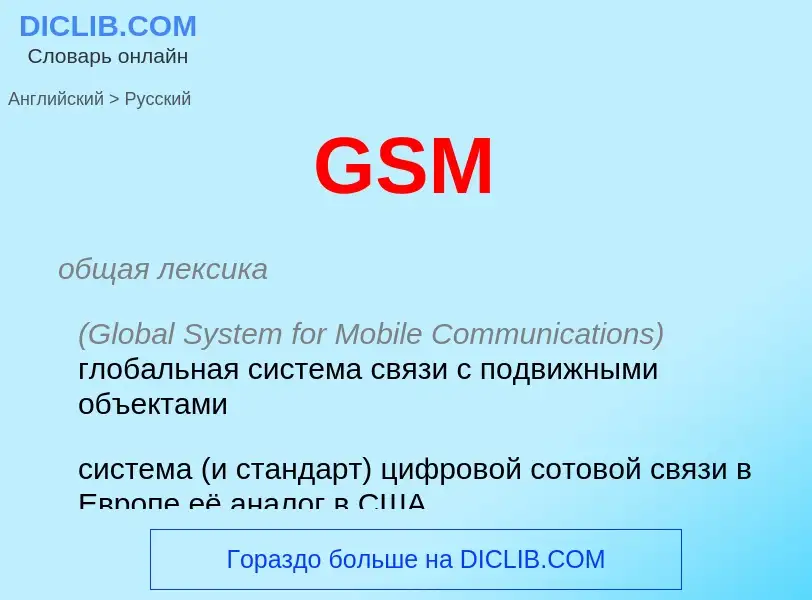Μετάφραση και ανάλυση λέξεων από την τεχνητή νοημοσύνη ChatGPT
Σε αυτήν τη σελίδα μπορείτε να λάβετε μια λεπτομερή ανάλυση μιας λέξης ή μιας φράσης, η οποία δημιουργήθηκε χρησιμοποιώντας το ChatGPT, την καλύτερη τεχνολογία τεχνητής νοημοσύνης μέχρι σήμερα:
- πώς χρησιμοποιείται η λέξη
- συχνότητα χρήσης
- χρησιμοποιείται πιο συχνά στον προφορικό ή γραπτό λόγο
- επιλογές μετάφρασης λέξεων
- παραδείγματα χρήσης (πολλές φράσεις με μετάφραση)
- ετυμολογία
GSM - translation to ρωσικά
общая лексика
(Global System for Mobile Communications) глобальная система связи с подвижными объектами
система (и стандарт) цифровой сотовой связи в Европе её аналог в США
(grams per square metre) граммов на квадратный метр, г/м2
единица измерения плотности бумаги
общая лексика
GSM-Railways
стандарт железнодорожной сотовой радиосвязи GSM-R
для организации связи в нём выделены частоты 876-880 и 921-925 МГц. Утвержден ESTI для применения в Европе. Обеспечивает абонентов, находящихся в поезде, мобильной связью с внешними абонентами или диспетчером. Базовые станции размещаются в поездах, вдоль путей и на ж/д станциях. Стандарт рекомендован Международным союзом железных дорог
Смотрите также
Βικιπαίδεια
The Global System for Mobile Communications (GSM) is a standard developed by the European Telecommunications Standards Institute (ETSI) to describe the protocols for second-generation (2G) digital cellular networks used by mobile devices such as mobile phones and tablets. GSM is also a trade mark owned by the GSM Association. GSM may also refer to the Full Rate voice codec.
It was first implemented in Finland in December 1991. By the mid-2010s, it became a global standard for mobile communications achieving over 90% market share, and operating in over 193 countries and territories.
2G networks developed as a replacement for first generation (1G) analog cellular networks. The GSM standard originally described a digital, circuit-switched network optimized for full duplex voice telephony. This expanded over time to include data communications, first by circuit-switched transport, then by packet data transport via General Packet Radio Service (GPRS), and Enhanced Data Rates for GSM Evolution (EDGE).
Subsequently, the 3GPP developed third-generation (3G) UMTS standards, followed by the fourth-generation (4G) LTE Advanced and the fifth-generation 5G standards, which do not form part of the ETSI GSM standard.
Beginning in the late 2010s, various carriers worldwide started to shut down their GSM networks. Nevertheless, as a result of the network's widespread use, the acronym "GSM" is still used as a generic term for the plethora of <n>G mobile phone technologies evolved from it.



![GSM [[cell site]] antennas in the [[Deutsches Museum]], [[Munich]], [[Germany]] GSM [[cell site]] antennas in the [[Deutsches Museum]], [[Munich]], [[Germany]]](https://commons.wikimedia.org/wiki/Special:FilePath/Kathrein antenna.jpg?width=200)




![Siemens UK GSM-R Cab Radio fitted on a [[Northern Rail]] Sprinter DMU Siemens UK GSM-R Cab Radio fitted on a [[Northern Rail]] Sprinter DMU](https://commons.wikimedia.org/wiki/Special:FilePath/GSM-R Cab Radio on Sprinter DMU.jpg?width=200)

![A GSM-R mobile phone used by the [[National Railway Company of Belgium]] A GSM-R mobile phone used by the [[National Railway Company of Belgium]]](https://commons.wikimedia.org/wiki/Special:FilePath/GSM-R Sagem TiGR 350R.jpg?width=200)


![ICE 3M]] at [[Gare de l'Est]] in Paris ICE 3M]] at [[Gare de l'Est]] in Paris](https://commons.wikimedia.org/wiki/Special:FilePath/Ice paris.jpg?width=200)



![TGV POS]], linking Paris to Germany and Switzerland TGV POS]], linking Paris to Germany and Switzerland](https://commons.wikimedia.org/wiki/Special:FilePath/TGV POS Nuremberg Ingolstadt.jpg?width=200)


